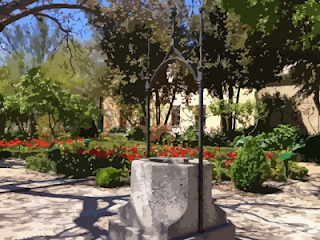The oral tradition tells that Loaces became ill with leprosy in a
state so serious and accused that all those around him fled from him,
including his relatives, friends and servants, in the fear that they
might be infected by such horrible evil.
To all those whom he asked for their help, they rejected him and ran away from him because of the disgust he was giving them.
The Dominicans of Orihuela took pity on him and welcomed him into his convent.They gave him all kinds of attentions and care with such care and affection that a few months later he is said to have completely healed.
From that day, it was commented that the waters with which they had washed his body every day were blessed by the hands of God and that from then on would be considered the well of the orchard from where they had extracted them like miraculous.
A few years later, one of the students of the school was impressed by this legend and reflected in one of the novels that most pride the oriolanos:
"The Leper Bishop."
To all those whom he asked for their help, they rejected him and ran away from him because of the disgust he was giving them.
The Dominicans of Orihuela took pity on him and welcomed him into his convent.They gave him all kinds of attentions and care with such care and affection that a few months later he is said to have completely healed.
From that day, it was commented that the waters with which they had washed his body every day were blessed by the hands of God and that from then on would be considered the well of the orchard from where they had extracted them like miraculous.
A few years later, one of the students of the school was impressed by this legend and reflected in one of the novels that most pride the oriolanos:
"The Leper Bishop."
The oral tradition tells that Loaces became ill with leprosy in a
state so serious and accused that all those around him fled from him,
including his relatives, friends and servants, in the fear that they
might be infected by such horrible evil.
To all those whom he asked for their help, they rejected him and ran away from him because of the disgust he was giving them.
The Dominicans of Orihuela took pity on him and welcomed him into his convent.They gave him all kinds of attentions and care with such care and affection that a few months later he is said to have completely healed.
From that day, it was commented that the waters with which they had washed his body every day were blessed by the hands of God and that from then on would be considered the well of the orchard from where they had extracted them like miraculous.
A few years later, one of the students of the school was impressed by this legend and reflected in one of the novels that most pride the oriolanos:
"The Leper Bishop."
To all those whom he asked for their help, they rejected him and ran away from him because of the disgust he was giving them.
The Dominicans of Orihuela took pity on him and welcomed him into his convent.They gave him all kinds of attentions and care with such care and affection that a few months later he is said to have completely healed.
From that day, it was commented that the waters with which they had washed his body every day were blessed by the hands of God and that from then on would be considered the well of the orchard from where they had extracted them like miraculous.
A few years later, one of the students of the school was impressed by this legend and reflected in one of the novels that most pride the oriolanos:
"The Leper Bishop."

No hay comentarios:
Publicar un comentario